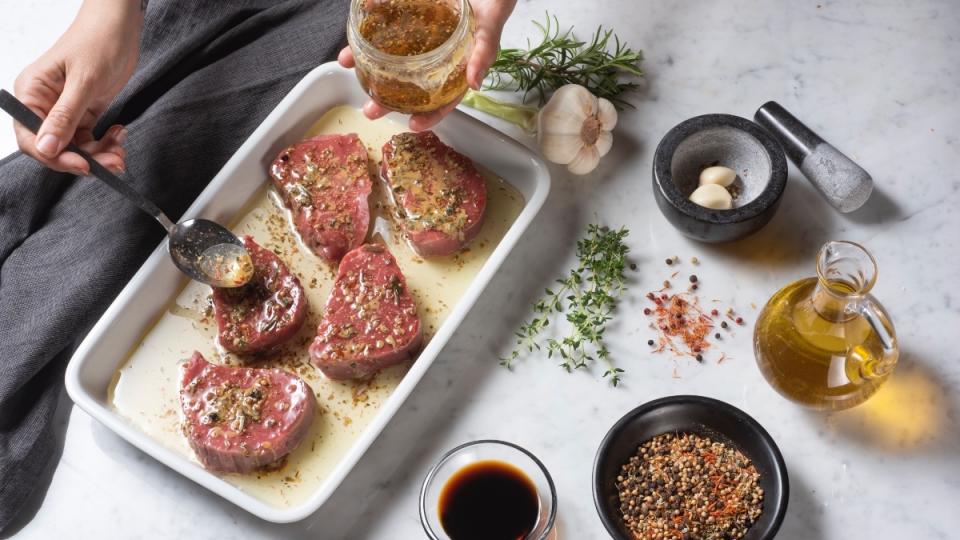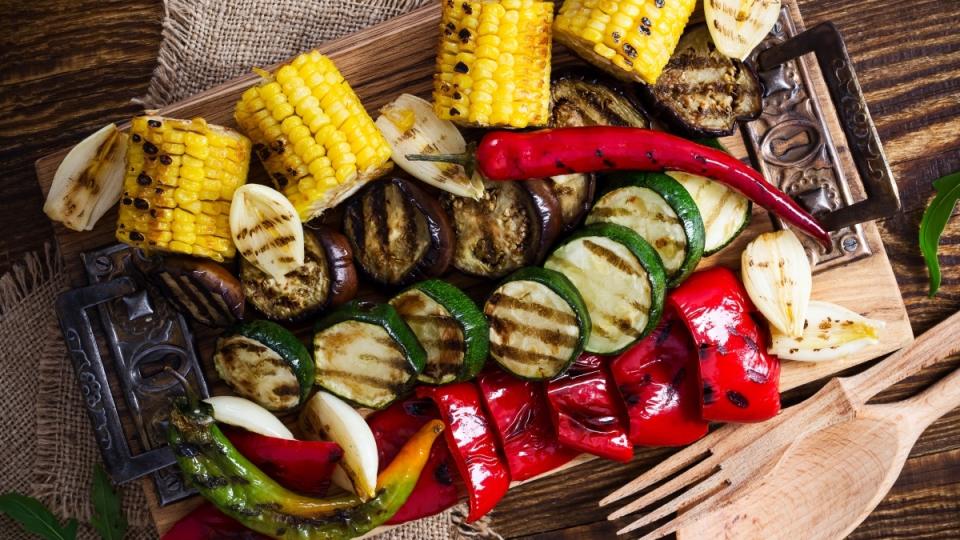Doctors Share the 5 Healthy Grilling Tips Everyone Needs To Know to Ward off Harmful Compounds
Firing up the grill is a fun (and tasty!) way to spend a Saturday afternoon. But if you aren’t careful, it can actually hamper your health. Turns out some of the things that make grilling so delightful — like the hot charcoal and sizzling fat — also produce harmful chemicals that may contribute to everything from eye irritation and gastrointestinal discomfort to cancer. Thankfully, healthy grilling is possible. Here, we provide doctors' easy tricks for doing just that!
The problem with grilling: bad byproducts
Grilling gets a bad health rap because it often involves cooking meat (especially red meat) at high temperatures. Those high temps give grilled protein that smoky flavor and crispy, charred sear. But they also produce several byproducts with potentially harmful effects.
Prasun Shah, MD, a board-certified gastroenterologist at Memorial Hermann Hospital in Houston, Texas, says these byproducts include:
1. Heterocyclic amines (HCAs)
HCAs form when amino acids, sugars and creatine (a compound found in muscle tissue) react to high temperatures, like an open flame or heated charcoal. Typically the longer something is grilled, the more HCAs it contains.
When you eat grilled food (especially grilled meat) your digestive tract absorbs HCAs and they enter your circulation. Unfortunately, “HCAs are known to cause damage to DNA, the genetic material in cells,” Dr. Shah explains. These genetic mutations have been shown to produce tumors in animal studies and “can contribute to the initiation and progression of cancer.”
2. Polycyclic aromatic hydrocarbons (PAHs)
Like HCAs, PAHs form when you cook meat at high temperatures over charcoal or an open flame. During grilling, fat and juices ooze from the meat causing smoke and flame to billow upward. The smoke contains PAHs which can adhere to the meat and ultimately enter your body. Dr. Shah says PAH exposure has been linked to various health problems, including nausea, eye irritation and respiratory issues.
3. Advanced glycation end products (AGEs)
AGEs form when sugars combine with proteins and fats during the grilling process. Misagh Karimi, MD, a medical oncologist at City of Hope Orange County in Irvine, California, says AGEs are dangerous for two reasons.
First, they “bind to proteins in the body and alter their structure and function," he explains. "This can interfere with the normal functioning of proteins, enzymes and receptors.” In less scientific terms: they cause mutations that can result in lasting health consequences. Second, “AGEs are associated with oxidative stress. This can damage DNA and contribute to inflammation, a potential cause of cancer and tissue damage.”
Related: Is Aluminum Foil Safe For Grilling? Here’s What You Need To Know
The 5 best healthy grilling tips
Considering the potential harm these three-letter byproducts can cause, you might assume grilling is off-limits. But that’s not the case! “You can enjoy the delicious flavors of grilled foods while minimizing the formation of cancer-causing chemicals,” Dr. Shah reassures. Here’s how:
1. Healthy grilling hack: Marinade meats
Marinades enhance flavor and make grilled meats more tender. And according to Dr. Karimi, they can also act as an antioxidant, preventing cancer-causing chemicals from forming.
“Previous studies have indicated that marinating meat 30 minutes before grilling may decrease significantly or even eliminate carcinogen formation,” he says. In fact, a study in the Journal of Food Science found that marinating beef steaks before grilling them decreased HCAs by up to 88%. Similarly, applying sauces or marinades during the last few minutes of grilling can keep the meat from charring (another source of cancer-causing compounds).
Rita Faycurry, RD, a registered dietitian at Fay, says there are two types of marinades: acidic and enzymatic marinades. Both make grilling more flavorful, but only “acidic marinades help minimize AGEs, HCAs and PAHs. [These marinades] are made from citrus, vinegar, yogurt or wine.” Her go-to recipe:
Ingredients
4 (4 oz.) pieces of steak or chicken
3 Tbs. low-sodium soy sauce
2 Tbs. red wine vinegar
1 Tsp. garlic powder
1 Tbs. fresh, grated ginger
1 Tbs. extra virgin olive oil
To do: Place the steak or chicken pieces into a refrigerator-safe container with plenty of room. Mix the marinade ingredients in a separate bowl, then pour the mixture over the chicken or steak. Marinade in the fridge for 6 -24 hours before grilling. (Need more inspiration? Check out our delicious Jamaican jerk marinated chicken recipe.)

2. Healthy grilling hack: Pre-cook red meat
Remember how we said that cancer-causing substances like HCAs are more likely to occur in high heat? Dr. Sha’s advises pre-cooking red meat like burgers and steaks on the stovetop. Heating methods like pan-searing, sauteing and simmering help reduce the cooking time required on the grill. And less grill time means less opportunity for cancer-causing byproducts to form.
Don't want to switch on the stove? A microwave will do the trick, too. “Place your meat in a microwave-safe dish and cook it on high power for a few minutes until it’s partially cooked but not fully done,” Dr. Shah says. Then transfer the meat to the grill to finish cooking.
3. Healthy grilling hack: Grill in the ‘Goldilocks zone’
Carcinogens like HCAs, PAHs and AGEs form rapidly under high heat. But Dr. Karimi says “reducing your grill’s temperature is an advisable way to reduce the formation of [these] harmful compounds.”
Most experts recommend keeping your grill at a medium-high temperature, ideally within the "Goldilocks zone" of 375-400 degrees Fahrenheit. “Generally, cooking at high heat [about 400 degrees F or higher] is considered undesirable,” Dr. Karimi says. Keeping your grill’s temperature below this threshold won’t prevent carcinogens from forming, but it can significantly reduce their number.
It’s easier to make temperature adjustments on a gas grill, but you can do it with charcoal, too. “I like using two heat zones — one with direct heat and the other with indirect heat,” Dr. Shah says. To do this, stack all your coals on one side of the grill and leave the other side bare. This creates a “hot” zone and a “warm” zone.
Adjusting the air vents on your charcoal grill can also help. Dr. Shah says this regulates airflow and in turn, temperature. Likewise, he recommends using a little charcoal at a time and only adding more as needed.
4. Healthy grilling hack: Consider a swap

When it comes to healthy grilling, what you grill is just as important as how you grill it. “Grilling fruits and vegetables has significantly lower risks [than red meat],” Dr. Shah says. “These foods are naturally low in protein and fat” so they’re less likely to produce cancer-causing chemicals.
Plus fruits and vegetables have shorter cooking times and can be cooked at lower temperatures than meats. They’re also loaded with antioxidants, vitamins and minerals, which Dr. Shah says protect against oxidative stress and inflammation. (See our recipe for a grilled veggie platter to get started.)
If vegetarian grilling doesn’t excite you, consider grilling white meats like skinless chicken breast or fish. These proteins often cook at lower temperatures than red meat and they aren’t as fatty, which equates to a lower cancer risk.
5. Healthy grilling hack: Cut back on char
A crispy, charred crust gives grilled food that extra punch of flavor, but moderation is key. “Avoid burning anything — vegetables or meat — as excessive charring can be a carcinogen,” Dr. Karimi says. You don’t have to avoid char completely, but keeping it to a minimum is a smart move for your health.
Faycurry says there are several easy ways to do this. Trimming excess fat off red meat before grilling prevents the fat from dripping onto the open flames, reducing charring and smoking. Frequently flipping red meat, like burgers and steaks, is also a good idea. This ensures an even cook and keeps char from collecting.
To minimize char buildup in your grill, clean the grates every time you cook. Since char is loaded with carcinogens, eliminating buildup goes a long way toward protecting you and your loved ones’ health.
For more of our best grilling tips and tricks:
Is Aluminum Foil Safe For Grilling? Here’s What You Need To Know
How to Grill Hot Dogs — Chef’s Secret Makes ‘Em Crispy + Juicy for Your Memorial Day BBQ
How to Light Charcoal Without Lighter Fluid — BBQ Pros’ Genius Tricks Make It Easy
This content is not a substitute for professional medical advice or diagnosis. Always consult your physician before pursuing any treatment plan.

